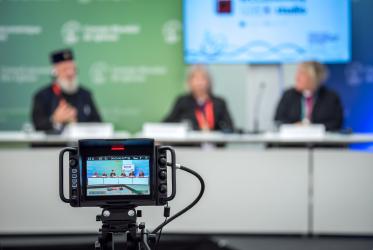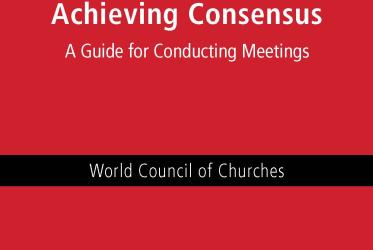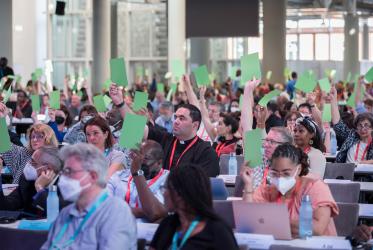The member churches of the World Council of Churches nominate 85% of the delegates to the Assembly. The Central Committee must confirm their nominations.
The Central Committee nominates 15% of the delegates to the Assembly, based on the proposals and alternates submitted by member churches for consideration. Once nominated these persons become delegates of their church with no particular distinction from other delegates.
The deadline for receiving delegate nominations, proposals for additional delegates and the names of advisors to delegations was 31 October 2004. However, due to a limited response, a reminder was sent to all churches, updating them on the status of their response. The new deadline for responding was 31 January 2005.
I. Delegate Nominations (85%)
As of 31 January 2005, 195 of 337 member churches have responded, naming delegates or indicating when they can expect to do so. This represents a 58% rate of response.
Among the delegates named, 35% are women and 65% are men. It is more difficult to calculate the percentage of youth nominations (30 years old or younger as of February 2006). Indications affirm 8% of the delegates named are youth. In addition, nominations show that 60% of delegates are ordained and 40% are laypersons.
Action Requested
1. The Central Committee is asked to review and confirm the delegations nominated by member churches to date. The list can be found as an appendix to the Report of the Assembly Planning Committee (Doc GEN 5).
2. The Central Committee is asked to consider the most appropriate response to those churches that have not yet indicated their intention to attend the Assembly.
3. The Central Committee is asked to consider authorizing the Officers of the Central Committee and the Executive Committee to confirm forthcoming member church nominations at their meetings in June 2005 (Officers), September 2005 (Executive Committee) and December 2005 (Officers).
II. Delegate Nominations (15%)
Based on the total number of delegate seats allocated by the Central Committee (728), the committee has the right to nominate up to 109 delegates. In the past this has been used to redress imbalances among the 85% of delegates named by member churches (i.e. women, youth, lay, Orthodox and Indigenous Peoples). It has also been used to nominate delegates representing the interests of member churches and the World Council of Churches.
As of 31 January 2005, 68 member churches have proposed 132 additional delegates for consideration by the Central Committee. The list can be found as an appendix to the Report of the Assembly Planning Committee (Doc GEN 5).
A number of criteria should inform the selection process of the Central Committee. The following criteria are proposed for consideration:
1. The percentages used to construct delegate seat allocation (i.e. regional percentages and Orthodox/Non-Orthodox percentages) should continue to guide the allocation of the 15% category.
2. Priority for redressing imbalances should be as follows:
o Youth
o Women
o Indigenous Peoples
o Persons with Disabilities
o Special Skills
Actions Requested
1. The Central Committee is asked to confirm the criteria used to in the 15% category nomination process.
2. The Central Committee is asked to nominate up to 80% of the seats distributed through the 15% category, i.e. up to 87 delegates out of 109.
3. The Central Committee is asked to consider authorizing the Officers of the Central Committee and the Executive Committee to nominate the remaining number of delegates, based on proposals from member churches and according to the criteria established, at their meetings in June 2005 (Officers), September 2005 (Executive Committee) and December 2005 (Officers).



